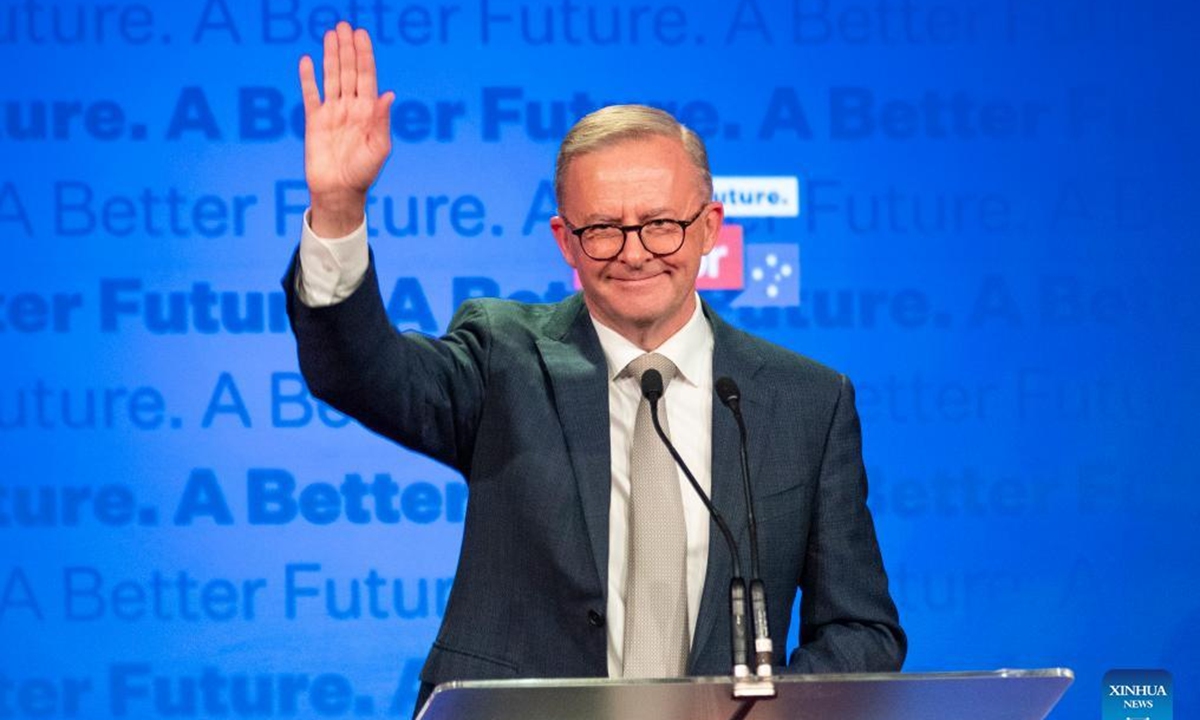
Australian Prime Minister Anthony Albanese gestures as addressing supporters in Sydney, Australia, May 21, 2022. Photo: Xinhua
Australian Prime Minister Anthony Albanese is anticipated to push security and China influence topics at the ongoing Pacific Islands Forum (PIF) in Fiji, after media hyped his reaction to China's four-point advice on improving bilateral relations, as Canberra always sees the South Pacific as its exclusive realm and is eager to use this forum to slander China's role in the region and reassert its "patriarchal" role, observers said.
Experts also believed that despite with a softer tone than from the Morrison government, Canberra will continue competition against China in a more subtle and tactical manner despite some positive signs in the direction to improving China-Australia relations.
Ensuring that Australia remains "the security partner of choice" for Pacific island nations amid China's rising influence will be a key topic for Albanese at the forum, Australia's 9news reported on Monday.
Albanese and his New Zealand counterpart Jacinda Ardern last week agreed at their meeting in Sydney that the security implications of China's so-called encroachment in the region needed to be on the agenda of the forum, which last through Monday to Thursday.
Observers attributed Australia's efforts to paint China as a regional disturbing element as due to discomfort caused by China entering a "self-indentified backyard."
Chen Hong, president of the Chinese Association of Australian Studies, told the Global Times on Tuesday there are strong Australian pushes behind the PIF, with the US standing backstage.
Feeling anxious about China's presence in its sphere of influence, Australia is unsurprisingly using the platform as a vehicle to compete with China, said Chen, who is also director of the Australian Studies Center at East China Normal University in Shanghai. "When calling the Pacific nations a big family, Australia designated itself as the patriarch," he said.
The expert cited Albanese and Foreign Minister Penny Wong's attendance at the PIF as evidence that Australia wants stronger involvement with Pacific island countries (PICs) to compete against China, although China has been reiterating the South Pacific should not be an arena of major power competition and that China seeks no exclusive role in the region.
China always upholds mutual respect, openness and inclusiveness in developing relations and cooperating with PICs. During his recent meeting with Wong on the sidelines of the G20 Foreign Ministers' Meeting in Bali, Indonesia, Chinese State Councilor and Foreign Minister Wang Yi noted China has also carried out tripartite cooperation with countries including Australia and New Zealand in the South Pacific region. Wang also made four-point suggestions in improving bilateral relations.
Some Australian media hyped the suggestions. In response, Albanese said Australia will continue to cooperate with China where it can but won't shy away from standing up for the national interest.
"Look, Australia doesn't respond to demands. We respond to our own national interest,'' Albanese said.
Australia's reaction, albeit with a softer tone that from the Morrison government, foretells that despite positive signs in the direction to improving China-Australia relations, Canberra will continue competition against China in a more subtle, tactical and sophisticated manner, Chen said.
For Pacific island nations, which expect to be friends to all and enemies to none, cooperation with China has no political provisions and is beneficial to their national interests, while Western-style cooperation usually bears political conditions and eyes comprehensive influence, and even interference in PICs' internal affairs as well as foreign policies, experts said.
The Western way of using economic bait to kidnap and coerce PICs' policies has prompted discontent from the region.
The Fiji Times published an opinion authored by scholars at the Australian National University and the Center for Pacific Islands Studies of University of Hawaii to slam the Partners in the Blue Pacific (PBP), an initiative the White House announced on June 24 that includes Australia, Japan, New Zealand and the UK.
The opinion stated the initiative puts the PBP under the Pacific regionalism umbrella without permission and on its own terms. It excludes others such as China who are dialogue partners of the PIF, and who are clearly "delivering results" in the region, and goes against the "friends to all" doctrine of the PIF.
Its high-sounding rhetoric of partnership and cooperation, claimed respect for Pacific agendas, as well as references to appropriate consultation with Pacific leaders, hides deeper geopolitical purpose, reads the opinion piece.
The five PBP powers have co-opted the name and narrative of the "Blue Pacific" to advance their interests, created an inner circle which complicates and ignores existing structures and bypassed normal regional decision-making practices.




